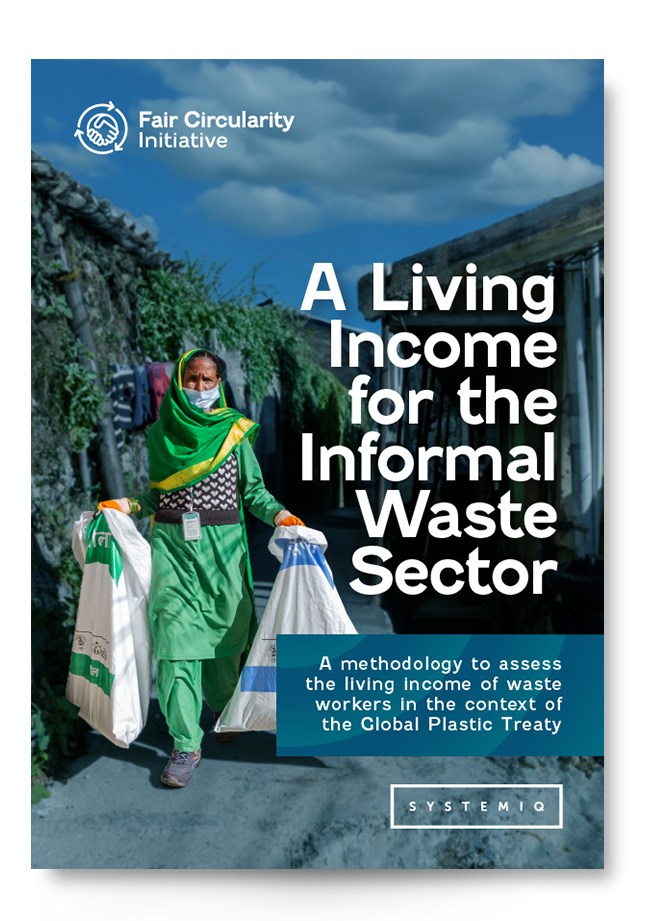A living income for the informal waste sector
A methodology to assess the living income of waste workers in the context of the Global Plastics Treaty
Download
19 - 24 million
Informal workers, making up ~0.5 - 1% of the global workforce
60%
Informal workers account for
60% of global plastic collected for recycling
15 - 20%
Informal workers jointly collect and process 15-20% of metropolitan waste on a global scale
ABOUT THE REPORT
A Living Income for the Informal Waste Sector highlights the often overlooked contribution of informal waste pickers to waste management systems and calls for improvements to their living and working conditions. It advocates for the implementation of a “living income” and leverages the Anker methodology to evaluate waste pickers’ earnings. The report reveals the gap between the current incomes of informal waste pickers in Brazil, Ghana and India and what constitutes a decent standard of living locally, emphasizing the need for policy changes to address this.

The report recommends the inclusion of clear provisions in the Global Plastics Treaty on waste management policies and extended producer responsibility to support the rights and livelihoods of informal waste workers. It also urges governments to legally recognize informal waste picking, ensure access to public services and include the input of waste pickers in policymaking.
Finally, the report introduces the Fair Circularity Initiative and its Principles for safeguarding the human rights of workers in the informal waste sector, calling on companies and stakeholders to join forces in supporting waste pickers towards a just transition.
Download
WEBINAR
View the study launch webinar
Explore the recording of the release webinar hosted by the Fair Circularity Initiative and Systemiq, unveiling the ‘A Living Income for the Informal Waste Sector‘ study. See insights shared by the Systemiq, WIEGO, Hasiru Dala and others on the just transition and a living income for informal waste pickers.
Objectives
Addressing the problem
The project will inform the negotiations for an international legally binding instrument to end plastic pollution and help addressing the problem in the following ways:
- Present the concept of living income (the required earnings for a decent standard of living) in the context of informal waste pickers
- Provide a practical methodology to evaluate waste pickers earnings versus a living income
- Offer insights to stakeholders from case studies in locations of Brazil, Ghana and India

Their role is undeniable
Advancing human rights and enhancing the resilience of the waste system
In many countries, these informal workers are underpaid, marginalized and vulnerable.
To bring greater ambition to the Global Plastics Treaty and realize national plans, countries must deepen their understanding of the concept of a living income.
Just Transition
Living Incomes
Living income – the earnings level for a decent standard of living – represents a critical milestone towards a just transition. The study presents a practical methodology for companies to promote the provision of a living income within their supply chains.


Three case studies
Current earnings
Earnings of waste pickers in surveyed locations generally fell short of a living income. The drivers behind this income gap vary substantially depending on the local context.
Momentum is building
Policy and company action
Governments and corporates have a vital role to play in enabling a just transition, including through the Global Plastics Treaty.

NEXT STEPS
The Global Plastics Treaty presents a unique opportunity towards a just transition for informal waste pickers
- Explicit inclusion and concrete targets for waste pickers’ rights, support of associations and cooperatives, and legal protection
- An annex should delineate key principles for designing effective Extended Producer Responsibility (EPR) to promote and operationalize a just transition
- Involvement of waste pickers and other informal workers in the establishment of these targets and provisions

Local policy makers and companies should act to close income gaps
Local & National Governments
- Recognizing waste picking as a legitimate occupation
- Encouraging the formation of cooperatives and associations
- Working on access to healthcare, housing, education
- Strengthen EPR frameworks to include waste pickers & cooperatives
- Supplying essential equipment for safety and better earnings
- Improving the access to finance and cooperative funding entities
Companies
- Recognizing linkages to informal waste sectors in their value chains
- Applying UN Guiding Principles on Business & Human Rights (UNGPs)
- Adopting Fair Circularity Principles in value chains & policy frameworks
Further Reading
If you found this report useful, there’s more to explore…
Learn more
For further information on this study please contact
Systemiq at [email protected]
or the Fair Circularity Initiative at www.faircircularity.org/register-interest












